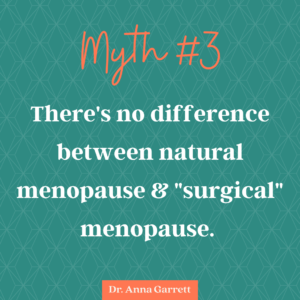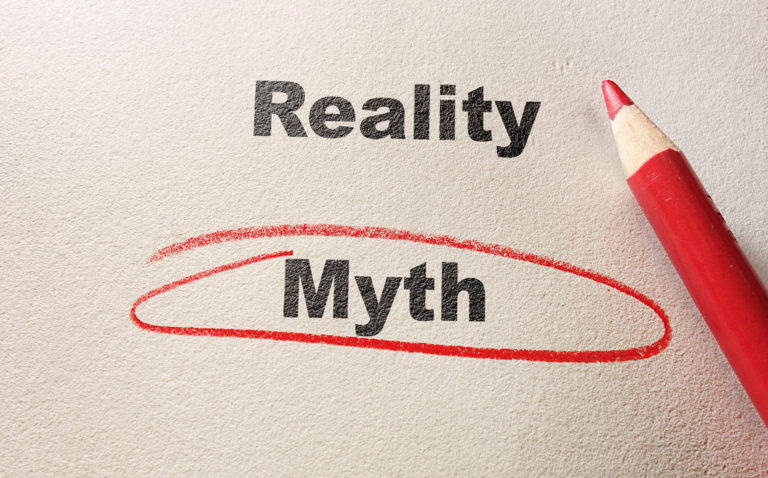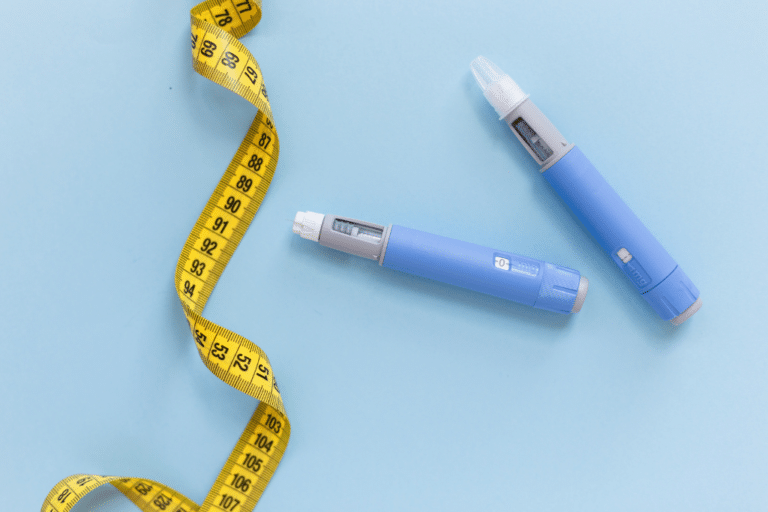Real myths in perimenopause.
The changes that women experience during perimenopause and menopause can throw even the most cool, calm, and collected women off their game. Unfortunately, myths abound during this time and it’s easy to get confused when you read conflicting information or worse, yet, you hear it from your doctor. As a Doctor of Pharmacy, I make it my business to keep up with the latest literature so I can share it with you. Let’s take a look at the top 5 myths I commonly hear and set the record straight.
Myth #1: Menopause Doesn’t Happen Until Your 50’s
Truth: The average age of menopause is 51…but there’s a huge range of what’s normal. Menopause is the day that marks 1 year since your last period, so it’s technically one day of your life. Anything before that is perimenopause which can start in your 30’s; anything after is considered post-menopause. It’s possible to reach menopause in your 30’s or 60’s; both of which are normal even though outside the average.
Myth #2: Weight Gain is Inevitable in Perimenopause and Menopause
Truth: Weight gain is very common in menopause because hormonal shifts make weight loss more complex. It’s no longer as simple as “calories in, calories out.”
As you transition into perimenopause and menopause, your ovaries make fewer sex hormones, and your body may respond by trying to protect itself. Its preferred method of protection is to store fat, especially around the waist, hips, and thighs. Fat stored in these areas also produces more estrogen on its own, which in turn, leads to more weight gain. Add stress to the mix with higher cortisol production and it’s a recipe for weight gain around the waist.
Despite these changes, you can still achieve a healthy weight. If your first reaction to weight gain is to cut back calories or exercise like crazy, think again. That throws your body into stress mode and cortisol kicks in. Excellent nutrition and lowered carbohydrates help women balance their hormones and gradually return to their natural weight.
Myth #3: There’s No Difference Between Natural Menopause and “Surgical” Menopause
If you’ve had a hysterectomy, you know this is UNTRUE. If you have your ovaries removed, you’re thrown into menopause overnight instead of gradually. This is very hard on your body.
 Even if your ovaries are left intact, there’s likely disruption of the blood supply to them which will keep them from fully functioning. Changes may be less severe when you keep your ovaries, but they are unpredictable. Many women need estrogen, progesterone, and testosterone replacement to feel their best after a hysterectomy.
Even if your ovaries are left intact, there’s likely disruption of the blood supply to them which will keep them from fully functioning. Changes may be less severe when you keep your ovaries, but they are unpredictable. Many women need estrogen, progesterone, and testosterone replacement to feel their best after a hysterectomy.
And don’t let your doctor tell you that you don’t need progesterone. You have progesterone receptors all over your body (not just in your uterus). They need love too.
Myth #4: The First Sign of Menopause is Hot Flashes
There’s a huge variation in the symptoms women experience in perimenopause. Some women sail through with nary a hot flash. But others begin having symptoms like weight gain, irritability, fatigue, anxiety, and insomnia in their mid-30’s. And symptoms can last for more than 10 years!
There are approximately 34 symptoms of perimenopause….any of which could be your first sign that your hormones are shifting.
That’s why it’s critical to pay attention to your body. If you’re starting to feel like Mother Nature has hit-and-run on your mojo, consider the possibility that hormone shifts are beginning.
Myth #5: After Menopause, Your Body Doesn’t Produce Hormones
Truth: No matter how far past menopause you are, you still have hormones! Most of the production is from the adrenal glands. In fact, in menopause, 50% of the estrogen and progesterone are produced by the adrenals.
Some hormones like estrogen and progesterone do decrease once your reproductive cycle ends because they’re needed less. Your body still produces them, just in smaller amounts. Even so, they can still be out of balance.
For some women, the symptoms of hormonal imbalance disappear or decrease post-menopause. For others, symptoms continue and include vaginal dryness, hot flashes, urinary incontinence, urinary tract infections, and weight gain.
Let’s Talk
With such a wide variety of symptoms and the fact that many of them look like something else, it’s no wonder that many women don’t connect these to a perimenopausal hormonal imbalance. If you want to understand more about what’s going on with your body, let’s talk. You can schedule a consultation with me to explore ways we might work together here.
Dr. Anna Garrett is a menopause expert and Doctor of Pharmacy. She helps women who are struggling with symptoms of perimenopause and menopause find natural hormone balancing solutions so they can rock their mojo through midlife and beyond. Dr. Anna is the author of Perimenopause: The Savvy Sister’s Guide to Hormone Harmony. Order your copy at www.perimenopausebook.com.
Dr. Anna is available for 1-1 consultation. Find out more at www.drannagarrett.com/lets-talk




